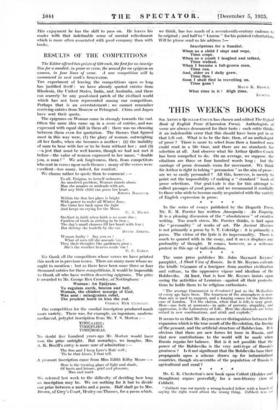RESULTS OF THE COMPETITIONS
The Editor offered two prizes of £10 each, the first for an inscrip- tion for a sundial, in prose or verse, the second for an- epigram on woman, in four lines of verse: A • new competition will be announced in next week's SPECTATOR.
Tax experiment of leaving the competitions open so long has justified itself : we have already quoted entries from
Rhodesia, the United States, India, and Australia, and there can scareelyThe any good-sized patch of the civilized world
which has not been represented- among- our competitors. Perhaps that is an- overstatement ; we cannot remember receiving entries from Moscow or Petrograd.- China and Japan
• have sent their quota.
The epigrams on Woman came in strongly towards the end.
• Often the same idea came up in a score of entries, and was expressed with equal skill in them all ; there was no choosing • between them even for. quotation.- The themes that :figured most in this way were, (1) the glory of woman, outweighing . all her faults, when she becomes a mother ; (2) the inability of man to bear with her or to be born without her ; and (3) —a jest that must be well known, though we had not met it before—the value of woman expressed in her name, " double you, o man ! " We ask, forgiveness, then, from competitors
. who sent-in verses upon such themes ; many of the verses were excellent—too many, indeed, -for comfort.
• We choose rather to quote than to comment :—
To all, Enigina, to herself unknown, An unsolved problem, Woman stands alone. Man she amazes or misleads with art, - But any little child can guess her heart.
RHODA BALFOUR.
Within the Sun her place is bright With power to make all Winter June.
She turns her back upon tho light And keeps on crying for the Moon. G. A. }Tress.
Stedfast in faith when faith is no more clue ; Careless of truth in striving to be true ; .
The day's small chances fill her heart with fear ; But destiny she leadeth by the ear.
DAVID ATKINS. -
Woman faulty ? Say you so ?
What of men till she amends-'em ?
They their thoughts like gardeners grow ; She's the weather heaven sends 'em !
" G. C. EA.RL.U.
We thank all the competitors whose verses we have printed this week or in previous issues. There are many more whom we ought to mention : but as there have been some three or four thousand entries- for these competitions, it would be impossible to thank all who have written deserving epigrams. The prize is awarded to Mr. George Rex Crowley, of Nottingham:—
- Woman: An Epigram.
To regulate earth, heaven and hell, Woman, the chiefest scourge of God, Was sent : misogynists rebel, The prudent learn to kiss the rod. .
GEORGE Ran 'CROWLEY.
The competition for the sundial inscription produced much more variety. There was, for example, an ingenious, modem- I mediaeval, polyglot inscription from Mr. T. S. Morton :--
TIMEIAAEIM; TIME ELMS . TIME MORAS.
No doubt five hundred years ago Mr. Morton would have von the prize outright. But nowadays, we imagine, . A.. K. BoviIFs entry is more sure of admiration :— • The Sun and I keep Love's Rule well ; 'Tis he that kisses, I that tell.
A pleasant inscription came from Miss Edith Kilby Moore :- Here is the trysting place of light and shade, Of haste and leisure, grief and pleasure, Man and maid.
We referred last week to the difficulty of deciding how long an inscription may be. We see nothing for it but to divide our-prize between a motto and_a poem. Half shall go to Mrs. Brown, of Grey's Court, Henley-on-Thames, for a poem which,
we think, has too much of a seventeenth-century cadence to be original ; and half to Luseus " for his pointed exhortation. Will he please send -us his address ?— Inscriptions for a Sundial.
When as a child I slept and wept, Time crept.
When as a youth I laughed and talked, Time walked.
When I became a full-grown man, Time ran.
And, older as I daily grew, Time flew.
Soon I shall find in travelling on, Time gone !
MAUD K. BROWN.
What time is it ? High time.
L


































































 Previous page
Previous page